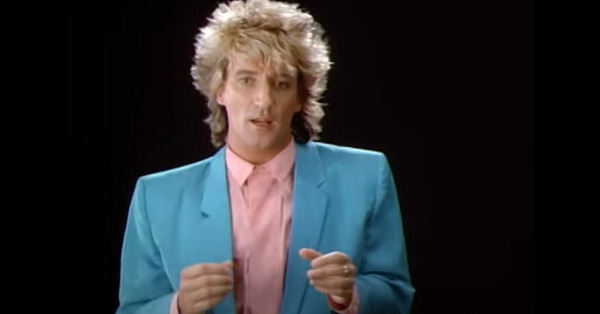Fluxblog #338: Muni Long • Bnny • Lauren O'Connell • Alessia Cara
Plus a good punk playlist and U2's misunderstood album Pop
This week’s playlist is WE SLOW DOWN AND DIE, a 90 minute mix of arty and apocalyptic punk songs featuring Liars, Fugazi, Erase Errata, Savages, A Frames, Ut, Control Top, Sleater-Kinney, Nation of Ulysses, Downtown Boys, Brainiac, and more. [Spotify | Apple Music]
POPTOBER, my new mini-series about U2’s fascinating and widely misunderstood 1997 album Pop, starts this Saturday with an episode in which my co-host Chris Conroy and I take a broad view on the record and the PopMart tour before getting into detail on the songs in the next two episodes. This is only available on the Fluxblog Patreon, and I promise you that you don’t really need to care about U2 to appreciate this, as in a lot of ways it’s more about the strangeness of the late ‘90s “end of history” moment in pop culture.


Our Own Happy Ending
Muni Long “Just Beginning”
“Just Beginning” is a song about feeling betrayed and heartbroken because you’ve deduced through Instagram that your boyfriend is cheating on you and just introduced you to his sidechick thinking you’re none the wiser. It wouldn’t take much for this song to be extremely petty, but Muni Long’s vocal performance keeps the emphasis squarely on her disappointment and frustration. She’s just theatrical enough to make to make the more banal elements of this seem very dramatic in context, but there’s a rawness in her voice that sounds genuinely wounded and betrayed. The arrangement maintains a similar balance – the main piano part has the feel of an impromptu club performance, but the synth washes signal melodrama without getting too saccharine.
Buy it from Amazon.
What’s A Few More Tears
Bnny “Promises”
“Promises” clocks in just under two minutes, which is exactly as much time as the song needs to shimmy and shake and project both a sexy atmosphere and a twitchy anxiety. Jess Viscius’ lyrics come from a place of uncertainty and ambivalence as she announces her disillusionment with a man in one breath and in the next admits to feeling seduced by him. Her vocal is breathy and sultry but also a little tough, conveying traces of anger and disappointment. As the song goes along that seems to be directed more inward though – she’s letting herself down, but as she sings “I haven’t been happy in years / so what’s a few more tears?”
Buy it from Bandcamp.

I’ll Never Ask For The Truth
Lauren O’Connell “Game of Pricks”
The raw material of “Game of Pricks” is so exquisite that only a truly inept musician could fuck it up. It’s a song that will make a mediocre artist sound better than they are, and while Robert Pollard’s core melody could be applied in many ways, there’s something elemental about it that makes it difficult to embellish. Lauren O’Connell, a singer-songwriter who has devoted a large chunk of her time to recording her interpretations of other artists’ songs on Bandcamp, manages to make “Game of Pricks” her own while being entirely faithful to the musicality of the original. O’Connell’s phrasing is crisp and simple, focused mainly on articulating the melody in a lovely tone while communicating a touch of shyness and vulnerability in her tone. Her arrangement replaces Guided by Voices’ garage rock aesthetics with a tidy minimalism – the guitar is hushed, there’s some light piano tinkling for atmosphere, and sparse electronic percussion moves along the dynamics but largely stays out of the way. The song is presented as this perfect immutable thing but O’Connell changes the feel and the gravity of it completely. This has the effect of shifting the perspective of the song – Pollard’s version is callous and caddish, but O’Connell zeroes in on the loneliness and self-destructive impulses at the heart of the song.
Buy it from Bandcamp.
Some Kind Of Black Magic
Alessia Cara “Somebody Else”
It took me a little while to realize that “Somebody Else” sounded weirdly familiar because what I was recognizing was elements from an unexpected source – the melodies, chords, and stylishly immaculate production style is all very Phoenix. Whether this was intentional or not the aesthetic suits Alessia Cara’s voice well, flattering the clarity of her tone and allowing space for more nuanced phrasing to register without dropping the direct and assertive tone of a pop track. The crispness of the music is also an effective contrast with Cara’s ambivalent tone through the song as she ponders how someone she once loved could become such a stranger to her. There’s no clear cut feelings here, just a woman trying to make sense of dulled pains, vague regrets, and uncertainty of how much it really matters that something has been lost.
Buy it from Amazon.
LINKS LINKS LINKS LINKS LINKS LINKS LINKS LINKS
• I love Chingy Nea’s take on After Hours, one of my favorite movies – it’s a horror film about not getting laid.
• Here’s Rachel Monroe in the Guardian on the continued growth of life coaching, an entirely unregulated field.
• I loved this week’s episode of Song Exploder which veered from its usual methods to present the making of John Lennon’s “God” entirely from archival audio. I think what really makes this work is that a lot of the audio is Lennon speaking extemporaneously during the process of arranging and recording the song in the studio, which is a lot more interesting and unfiltered than the sort of hindsight on creative process typically offered on the show.







